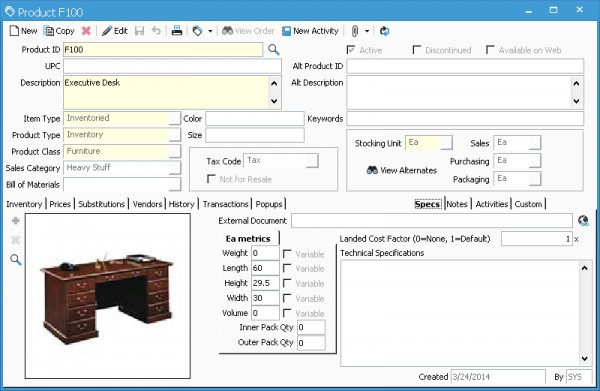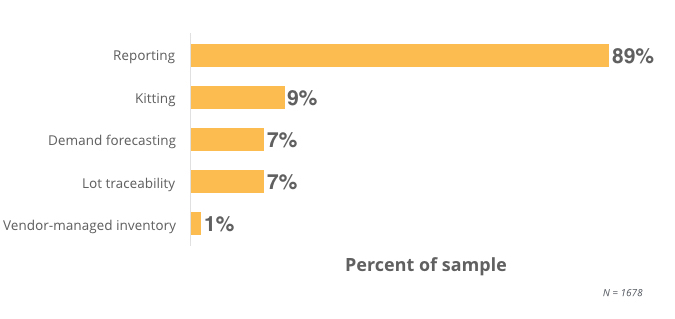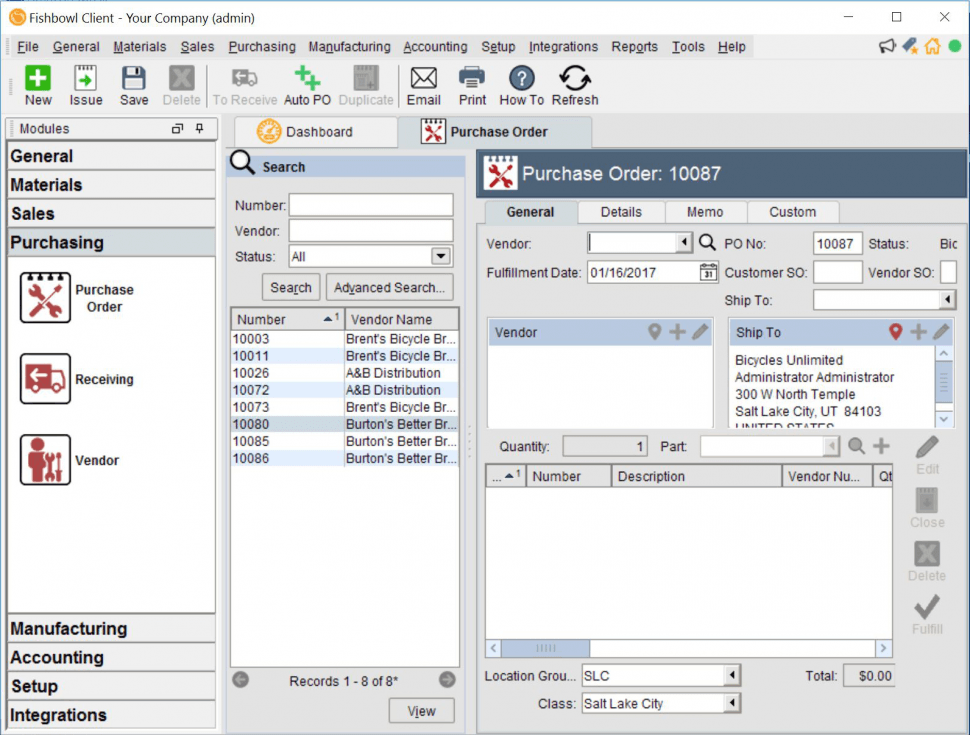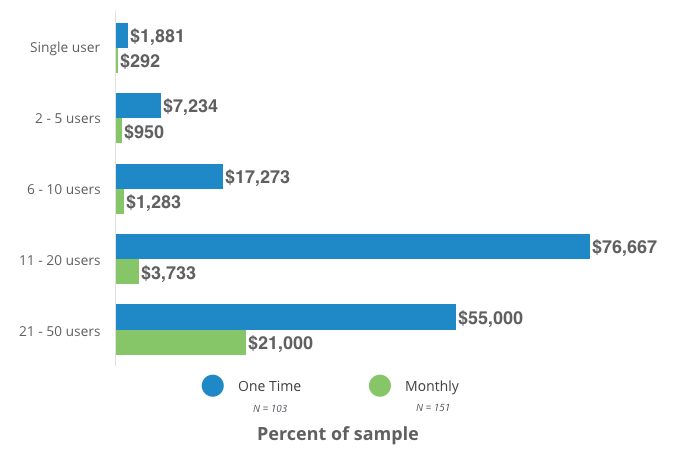Find the best Inventory Management Software
Compare Products
Showing 1 - 20 of 987 products
Sort by
Reviews: Sorts listings by the number of user reviews we have published, greatest to least.
Sponsored: Sorts listings by software vendors running active bidding campaigns, from the highest to lowest bid. Vendors who have paid for placement have a ‘Visit Website’ button, whereas unpaid vendors have a ‘Learn More’ button.
Avg Rating: Sorts listings by overall star rating based on user reviews, highest to lowest.
A to Z: Sorts listings by product name from A to Z.
Embrace ERP
Embrace ERP
If you are a medium to large enterprise (50 - 1 000+ users), look no further, you have found the right solution for your business. Embrace ERP is a proven, time-tested end-to-end enterprise resource planning (ERP) solution. Purpo...Read more about Embrace ERP
Netstock
Netstock
Netstock is a cloud-based inventory management solution which helps businesses handle purchase orders, customers, suppliers, demand forecasting and more on a unified platform. It allows professionals to manage bills of materials (...Read more about Netstock
UpKeep
UpKeep
FrontRunners 2024
UpKeep is an Asset Operations Management solution that helps businesses scale by giving every Maintenance and Reliability team the tools and information they need to run Operations efficiently and effectively. From your desktop to...Read more about UpKeep
Salesforce Commerce Cloud
Salesforce Commerce Cloud
Salesforce B2C Commerce is a cloud-based order management solution that enables businesses to streamline processes related to marketing campaigns, merchandising, order fulfillment and more. Professionals can improve social outreac...Read more about Salesforce Commerce Cloud
EZOfficeInventory
EZOfficeInventory
FrontRunners 2024
EZOfficeInventory is a dynamic asset and maintenance management solution tailored for companies of all sizes. The cloud-based software works as you do and is accessible from anywhere and at any time. Track items across locati...Read more about EZOfficeInventory
EZRentOut
EZRentOut
EZRentOut is a cloud-based equipment rental solution that caters to businesses across various industries such as construction, event management, IT, sports and more. Features include contract management, inspection management, med...Read more about EZRentOut
Averiware
Averiware
Averiware offers an integrated cloud-based enterprise resource planning solution. Key features include accounting and financial management, customer relationship management, salesforce automation, , supply chain management, and hu...Read more about Averiware
Bellwether Purchasing Software
Bellwether Purchasing Software
FrontRunners 2024
Bellwether Purchasing Software is an easy-to-use, cloud-based purchasing and inventory management solution ideal for SMB customers in all industries who create 50-1000 POs a month. Primary features include requisitions, approval ...Read more about Bellwether Purchasing Software
QStock Inventory
QStock Inventory
QStock Inventory is an inventory management solution designed for growing small to midsize businesses in the consumer goods, electronics, high tech, manufacturing and e-commerce markets. The solution integrates with QuickBook...Read more about QStock Inventory
EazyStock
EazyStock
EazyStock is a market-leading inventory optimization tool that connects with ERP systems to digitalize inventory management operations. While most ERPs are good at stock control, many rely on users to manually calculate and input...Read more about EazyStock
IntelliTrack
IntelliTrack
IntelliTrack Assets helps businesses maintain and track various assets including technology, furniture, tools, off-site equipment, and more. The platform enables organizations to monitor asset movement, maintenance schedules, assi...Read more about IntelliTrack
CStoreOffice
CStoreOffice
CStoreOffice is a cloud-based inventory management solution by Petrosoft that helps businesses to keep track of their inventories and manage other back-office operations. CStoreOffice helps managers to eliminate dead inventor...Read more about CStoreOffice
SIMMS Inventory Management
SIMMS Inventory Management
SIMMS by KCSI is a comprehensive inventory and supply chain management (SCM) system that helps businesses organize and control various aspects of their inventory. With features like serial number tracking, lot control, kitting and...Read more about SIMMS Inventory Management
AdvancePro
AdvancePro
AdvancePro offers a cloud-based inventory management solution for a variety of industry verticals to help them manage buying, warehousing, selling and shipping processes. The solution closely visualizes the stock levels at all tim...Read more about AdvancePro
Acctivate Inventory Management
Acctivate Inventory Management
Built for growing product-selling businesses using QuickBooks, Acctivate is a premium inventory management & multi-channel order fulfillment add-on that helps you focus on growth without operational limitations. Solve for QuickBo...Read more about Acctivate Inventory Management
Extensiv Warehouse Manager
Extensiv Warehouse Manager
Extensiv Warehouse Manager is a cloud-based inventory management solution that can integrate seamlessly with pre-existing CRM, accounting, and logistics software. It provides greater visibility over the business and can be accesse...Read more about Extensiv Warehouse Manager
Accolent ERP
Accolent ERP
Accolent ERP is an enterprise resource planning (ERP) and enterprise resource management (ERM) software suite designed for businesses in wholesale distribution, process manufacturing and assembly, and services companies. Accolent ...Read more about Accolent ERP
inFlow Inventory
inFlow Inventory
FrontRunners 2024
Looking for an inventory and order management system for your small or medium-sized business? inFlow is used in over 90 countries around the world for manufacturing, wholesale, distribution, ecommerce, and more. It's also simple t...Read more about inFlow Inventory
Stitch Labs
Stitch Labs
Stitch Labs is an integrated, cloud-based inventory and order management solution that caters to mid-size multi-channel retail brands. Stitch serves as an operational hub to brand operations, centralizing inventory across al...Read more about Stitch Labs
Unleashed
Unleashed
Unleashed Software is a cloud app that gives product businesses the freedom to better make, manage and move products by giving complete clarity and control over suppliers, production, warehouses and sales. Unleashed allows busines...Read more about Unleashed
Popular Comparisons
Buyers Guide
Last Updated: June 13, 2023What Is Inventory Management Software?
Inventory management software is software designed to track and manage items through various stages along the supply chain. Features include stock level management, inventory item categorization, sales order and purchase order tracking, barcode scanning, and automatic reorder point purchasing.
Retail businesses can typically use scaled-down systems focused on maintaining perpetual inventory data and inventory levels, whereas businesses with complex supply chains often use the inventory management functionality in ERP systems or with strong warehouse management integrations.
Depending on the complexity of your asset tracking and physical inventory needs, you may require features to support multiple sales channels, multiple warehouse management, and a mobile app. We'll get into more detail below.
Benefits of Inventory Management Software
While you can track inventory in Excel, spreadsheets only work for periodic inventory counts (i.e., the inventory system is only updated at intervals, say after physical stock counts). Inventory software is necessary to enable a true dynamic inventory system, where stock levels are updated continuously as sales are made and goods are received. Benefits include:
Improved inventory control and inventory optimization
Reduced reliance on stock takes
Simplified accounting
Competitive Advantages of Using Inventory Management Software
As a business owner, you need a good inventory management system that offers you a competitive edge. For e-commerce retailers, logistics providers, and businesses in other industries where margins can be razor-thin, you need inventory software that works hard for you.
Better synchronization: E-commerce retailers can synchronize inventory across digital channels (e.g., eBay, Amazon, Shopify etc.), physical retailers can synchronize multi-channel inventory across multiple stores and multi-channel retailers can synchronize e-commerce platforms with brick-and-mortar stores.
Greater efficiency: Inventory management systems can integrate with point-of-sale systems to update stock levels in real time as sales are made.
Reliable tracking: Advanced inventory features in ERP systems enables end-to-end tracking of goods, from raw materials to retail shelf. Asset management and product tracking greatly improve.
Business Sizes Using Inventory Management Software
Inventory management software is used by businesses of all sizes, across a variety of industries.
Our internal data shows that of a sample of 1,676 inventory management buyers who contacted us recently, most were small businesses, with 91 percent employing fewer than 100 people, and 75 percent generating less than $5 million annually.
Smaller businesses typically use a scaled-down solution in conjunction with a point of sale system and an accounting system.
Larger businesses (and enterprise businesses) typically use the inventory management tools of an ERP or supply chain systems, as these systems allow for inventory tracking across multiple links in the supply chain.
Software Related to Inventory Management
Inventory management functionality is included in a diverse group of software categories, such as:
Accounting software: Helps businesses automate their core accounting functions to more easily balance their books and provide proof of their financial standing. Systems typically include a centralized general ledger, accounts payable, accounts receivable, billing and invoicing and the ability to produce standardized reports.
Distribution ERP systems: These are required by a wide variety of businesses that operate in the middle of the supply chain between manufacturers and customers. Distribution software systems can feature a wide variety of functionality and features, including inventory control, warehouse management, CRM, order management and accounting.
Manufacturing ERP systems: Provides functionality to plan and execute projects from beginning to end, while automating materials planning, production tracking and scheduling and product lifecycle management.
Retail management systems: Many vendors combine point-of-sale systems with inventory management systems in a single platform. Retail ERP systems also include inventory functionality.
Warehouse management systems: These systems are inventory control systems specifically designed for warehouse inventory that also offer software automation for crucial warehouse processes. Automating processes such as warehouse picking has been conclusively shown to be vastly more efficient than manual methods.
Features Guide
A List of Common Inventory Management Solution Features/
Product categorization | Tracks stock levels according to item attributes such as size, color, lot/serial number etc. Generate bill of materials and streamline the reorder point process. |
Sales order and purchase order management | Tracks each product sale, order, wholesale purchase, build or delivery and automatically updates inventory quantities. |
Order management | Advanced systems like SAP, Oracle and Microsoft Dynamics can be set up to automatically reorder a product when it falls below a certain quantity. |

Specifying item attributes in Acctivate Inventory Management
Top-Requested Features
At Software Advice, we've helped thousands of buyers find the right software for their business. We've analyzed those interactions to determine the top-requested features by Inventory Management buyers, presented here:
Inventory Management Buyers' Top-Requested Features

The Inventory Management Solution Features You Really Need
Small business | Perpetual inventory: Allows small retailers and e-commerce retailers to synchronize product levels across multiple locations and multiple sales channels, both online and brick-and-mortar. Support for purchase order processing, inventory report, and invoicing are key features needed for small businesses to make smart business decisions. |
Midsize business buyer | RF support: Barcode scanning, especially on a mobile device barcode scanner, allows for powerful inventory control, improves count accuracy, and substantially speeds up processes like receiving, FIFO, and pick/pack/ship. |
Enterprise business buyer | Lot traceability: Manufacturers and large distributors are increasingly using lot and serial numbers to track products through their supply chains from raw materials to retail shelf. |

Processing a purchase order in Fishbowl Inventory
Pricing Guide
How Inventory Management Software Is Priced
Typically, inventory software is priced according to a number of factors. There are different pricing tiers for businesses of varying size, based on:
Number of users
Number of locations and sales channels (multi-channel inventory)
Number of SKUs/products
Number of orders processed per month
Number of devices (e.g., client PC, barcode scanner, mobile app and mobile device)
In addition, whether the software is hosted online or on-premise can make a difference in up-front versus recurring costs.
What Businesses Typically Budget for Inventory Management Software
We looked at a sample of buyer interactions to compare how much businesses are willing to budget either for monthly fees for cloud platforms or upfront, one-time fees for on-premise platforms. We've broken this data down by business size in terms of number of licensed users, since licensed users is one of the primary factors affecting pricing for systems:
Typical Inventory Management Software Budget

Hidden Costs to Look Out for
Hardware. Many businesses will need barcode scanners and printers, and retailers may also need hardware point of sale (POS) terminals.
Accounting integrations. Some vendors price their solutions based on how many accounting systems the inventory system integrates with.
End-to-end lot/serial number tracking. Businesses that need full traceability throughout the supply chain will need a full-blown ERP system, which is much pricier than a scaled-down system.
FAQs
What Are the Key Functions of Inventory Management Software?
Dynamic inventory. With inventory control software, stock levels are updated in real time as you receive purchase orders and process sales orders. A good inventory management tool will support more advanced inventory management techniques no matter the sales channel or complexity of inventory levels and asset types.
Elimination of manual processes. Barcode scanning speeds up tedious processes such as stock takes/inventory counts. Support for mobile devices and the availability of a mobile app can be key features in finding the best tool for your business.
Inventory optimization. E-commerce retailers selling across multiple sales channels, retailers with multiple stores and distributors with multiple warehouses all need to synchronize product and asset tracking. This can't be done with spreadsheets, since product levels need to be updated in real time, and requires an inventory management system.
What Questions Should I Ask Vendors When Evaluating an Inventory Management Solution?
Do you integrate with my accounting software? Inventory management vendors typically support a range of accounting integrations out of the box, but they might not integrate with your particular system, or they might charge extra for the integration. If you're using QuickBooks, you should evaluate the many vendors that specialize in QuickBooks integrations.
How many active clients do you have in my particular industry vertical? Different industries track different things (e.g., color, size, expiration date, style, serial number). Many vendors specialize in industries such as apparel or pharmaceuticals. Vendors without experience in these verticals may claim to be able to handle an implementation in your industry, but implementation costs may be prohibitive and the functionality limited. Be sure your vendor has experience with businesses in your industry.
What level of support do you offer for warehouse processes? While many inventory management vendors claim to offer warehouse management functionality, typically it's basic, e.g., generating paper pick lists and tracking by warehouse location. If you need advanced features such as FIFO processes, voice-directed picking or slotting, you may need to look into specialized warehouse systems.
Do you sell POS systems? What other hardware will I need? Retailers in particular should evaluate vendors that also sell POS systems. Distributors will typically need barcode scanners, label printers and other hardware to go along with the inventory management system.
What Are Some Drawbacks I Should Watch Out For?
There are no real drawbacks to using inventory management systems, but there are drawbacks to choosing the wrong vendor for your business.
Only ERP systems offer lot traceability. Lot traceability requires the using a lot number as an item attribute for inventory tracking in all of the supply chain/accounting software a business uses. Realistically, businesses should consider an integrated ERP software solution for lot tracking.
Crucial functionality for certain industries is missing from many platforms. Businesses that price items by weight (e.g., meat vendors, produce distributors) need to weigh inventory at crucial points in the supply chain for costing and inventory tracking. This is known as "catchweight management," and it's only found in specialized products. Additionally, advanced expiration date tracking and costing will require specialized products.
Inventory software offers varying levels of support for supply chain functions. They may lack some support altogether for supply chain functions, such as procurement or route optimization (for businesses with their own fleets). Logistics providers or 3PLs should be particularly careful when choosing a platform, since they specialize in areas of the supply chain where some inventory management vendors lack functionality.
Tips & Tools
Build a Business Case for New Software
Here are three major ROI drivers for inventory management software:
Improved inventory tracking and accuracy. Periodic inventory systems based on spreadsheets are inefficient and prone to human error. Once businesses hit a certain size, they can realize major cost savings simply by improving accuracy.
Synchronized inventory. By synchronizing inventory levels across multiple physical stores and e-commerce channels, you can avoid stock-outs and satisfy customers.
Automation of manual processes. Spreadsheets are incredibly time-consuming, as are inventory counts and the pick/pack/ship process. By partially or fully automating these processes, inventory software can make your business run much more efficiently.







